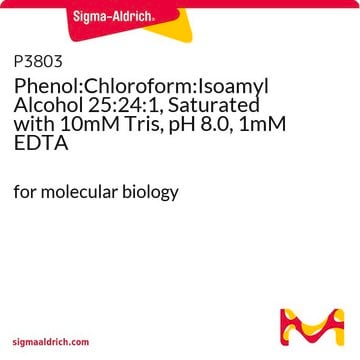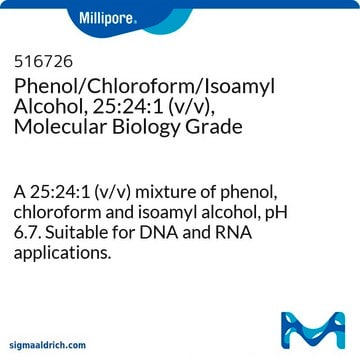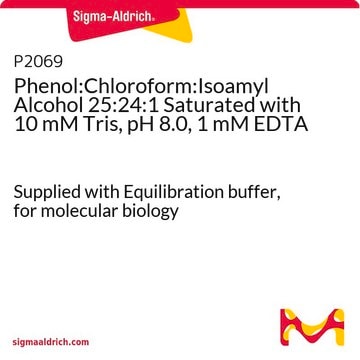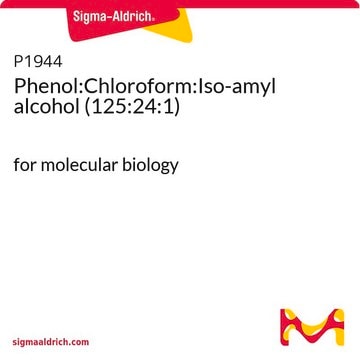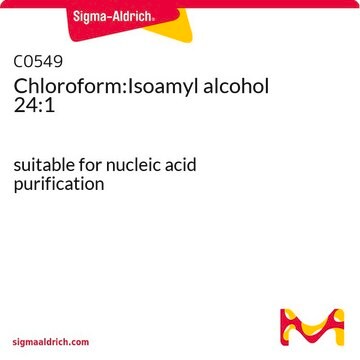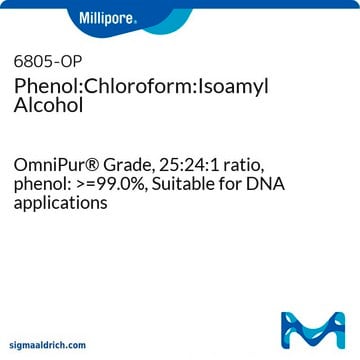77618
Mélange phénol/chloroforme/alcool isoamylique
BioUltra, for molecular biology, 49.5:49.5:1
Synonyme(s) :
phenol:Chloroform:Isoamyl Alcohol
About This Item
Produits recommandés
Qualité
for molecular biology
Niveau de qualité
Gamme de produits
BioUltra
Forme
liquid
Impuretés
DNases, none detected
RNases, none detected
phosphatases, none detected
proteases, none detected
pH
7.7-8.3(H2O-phase, after extraction with H2O, 1:1)
Densité
1.29 g/mL at 20 °C
Absorption
cut-off at 360 nm
Température de stockage
2-8°C
Chaîne SMILES
ClC(Cl)Cl.CC(C)CCO.Oc1ccccc1
InChI
1S/C6H6O.C5H12O.CHCl3/c7-6-4-2-1-3-5-6;1-5(2)3-4-6;2-1(3)4/h1-5,7H;5-6H,3-4H2,1-2H3;1H
Clé InChI
ZYWFEOZQIUMEGL-UHFFFAOYSA-N
Vous recherchez des produits similaires ? Visite Guide de comparaison des produits
Application
- Simultaneous quantification of multiple RNA cargos co-loaded into nanoparticle-based delivery systems.: This study highlights the use of a phenol-chloroform-isoamyl alcohol mixture for the extraction and quantification of RNA cargos from nanoparticles, facilitating accurate delivery system analysis (Lokras et al., 2022).
- Analysis of Circulating microRNAs and Their Post-Transcriptional Modifications in Cancer Serum by On-Line Solid-Phase Extraction-Capillary Electrophoresis-Mass Spectrometry.: This research utilized the phenol-chloroform-isoamyl alcohol mixture to extract microRNAs from serum samples, providing insights into cancer biomarkers (Pero-Gascon et al., 2018).
- The application of alkaline lysis and pressure cycling technology in the differential extraction of DNA from sperm and epithelial cells recovered from cotton swabs.: The study demonstrates the effectiveness of using phenol-chloroform-isoamyl alcohol for DNA extraction in forensic applications, improving the analysis of mixed samples (Nori and McCord, 2015).
- The critical role of DNA extraction for detection of mycobacteria in tissues.: This article emphasizes the necessity of phenol-chloroform-isoamyl alcohol extraction in accurately detecting mycobacterial DNA in tissue samples, enhancing diagnostic precision (Radomski et al., 2013).
Forme physique
Autres remarques
Mention d'avertissement
Danger
Mentions de danger
Classification des risques
Acute Tox. 3 Oral - Acute Tox. 4 Dermal - Acute Tox. 4 Inhalation - Aquatic Chronic 2 - Carc. 2 - Eye Dam. 1 - Muta. 2 - Repr. 2 - Skin Corr. 1B - STOT RE 1 Oral - STOT RE 2 - STOT SE 3
Organes cibles
Central nervous system, Liver,Kidney, Nervous system,Kidney,Liver,Skin
Code de la classe de stockage
6.1A - Combustible acute toxic Cat. 1 and 2 / very toxic hazardous materials
Classe de danger pour l'eau (WGK)
WGK 3
Point d'éclair (°F)
177.8 °F - closed cup
Point d'éclair (°C)
81 °C - closed cup
Équipement de protection individuelle
Faceshields, Gloves, Goggles, type ABEK (EN14387) respirator filter
Certificats d'analyse (COA)
Recherchez un Certificats d'analyse (COA) en saisissant le numéro de lot du produit. Les numéros de lot figurent sur l'étiquette du produit après les mots "Lot" ou "Batch".
Déjà en possession de ce produit ?
Retrouvez la documentation relative aux produits que vous avez récemment achetés dans la Bibliothèque de documents.
Les clients ont également consulté
Contenu apparenté
Professor Ron Raines works with Sigma-Aldrich on the development of reagents and tools for chemical biology such as the traceless Staudinger ligation reagent (670359). DTBA (774405), a superior biological reducing reagent to DTT, is another technology to come out of the Raines lab.
Professor Ron Raines works with Sigma-Aldrich on the development of reagents and tools for chemical biology such as the traceless Staudinger ligation reagent (670359). DTBA (774405), a superior biological reducing reagent to DTT, is another technology to come out of the Raines lab.
Professor Ron Raines works with Sigma-Aldrich on the development of reagents and tools for chemical biology such as the traceless Staudinger ligation reagent (670359). DTBA (774405), a superior biological reducing reagent to DTT, is another technology to come out of the Raines lab.
Professor Ron Raines works with Sigma-Aldrich on the development of reagents and tools for chemical biology such as the traceless Staudinger ligation reagent (670359). DTBA (774405), a superior biological reducing reagent to DTT, is another technology to come out of the Raines lab.
Notre équipe de scientifiques dispose d'une expérience dans tous les secteurs de la recherche, notamment en sciences de la vie, science des matériaux, synthèse chimique, chromatographie, analyse et dans de nombreux autres domaines..
Contacter notre Service technique
